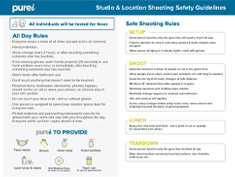A Sensible Guide To SEO
May 12, 2016
In the world of web design and digital marketing, if there's one thing more sought after than just about anything else on the planet, it's being ranked on page 1 on Google. Have you ever heard the joke, "Where's the best place to hide a dead body? Page 2 of Google". It's funny because it's true.
Although just about any statistics related to internet traffic and behavior can be questionable, it's a pretty common consensus that about 95% of Google search visitors don't make it to page 2 of a Google search, with some estimates claiming that as much as 75% of the traffic going to the top 5 results on page 1. So it's safe to say that if you're not on page 1, you're nobody.
There are only 10 spots on page 1, and for the vast majority of businesses and brands there are far more competitors than the 10 spots available. This knowledge has spawned an all out arms race for page 1 rankings, and along with that arms race comes an enormous amount of SEO companies promising page 1 rankings and results. Unfortunately, the practices of the vast majority of SEO companies out there can be likened to the practices snake oil salesmen, preying on people who don't have a clue about how search engines and web technology works with the promise of top rankings and fast results.
The inherent problem, as you might have already guessed, is that in the world of search engine optimization, no one can guarantee page 1 rankings. I'll repeat, no one can guarantee anything. If you really want to achieve page 1 rankings, and are looking to hire a consultant or company that is promising you page 1 rankings, that's pretty much a clear indication that you should stay away. There's only one entity on this planet that controls page 1 rankings on Google, and that's Google.
So what's a poor internet marketing soul to do? Well, for starters, do what we advise all of our clients to do, and that's to take a realistic and sensible approach to SEO. And that often is something that you can do all on your own without the need for an SEO consultant or company. A great place to start is to get educated on SEO as much as possible. Rather than read the slew of articles written by SEO companies out there, I prefer to seek wisdom from the wizard.
Go straight to the source - Google. Here's a great support article titled "Do you need an SEO?" It gives some great no-nonsense guidelines for what's acceptable and what's not acceptable. These are things you should be asking the consultant or company you're looking at helping you with SEO. Be sure to fully understand what they'll be doing to help improve your rankings.
You should definitely read the above article it in its entirety, but here are some key takeaways:
- No one can guarantee top rankings on Google.
- No one has any special relationship, gets special priority or preferential treatment from Google.
- Follow Google Webmaster Guidelines.
- Be wary of companies that can't clearly explain the details of the work they'll be doing.
Overall, there are two things that affect your rankings on Google. First, the coding and content of your website. Second, websites and content on the internet that is not your website. These two things are often referred to as on-page SEO and off-page SEO. On-page SEO is something that should be done, or should have been done when your website was designed. It's also something that can be done on an ongoing basis as you continue to refresh your site with updated content, and add new content that is relevant to your users, such as blog articles, case studies, event calendars etc.
Google's Webmaster Guidelines provide an excellent resource for understanding what you should and shouldn't be doing when it comes to on-page SEO. There is a lot of information on this page, and a lot of it may be too technical for people unfamiliar with how websites are built and coded. That's why, we believe, on-page SEO should ideally be performed by the company that built your website. Unfortunately, while they may be good designers, not all web design companies are great at optimizing code and content for search engines. Great websites should be built with usability, content, marketing AND SEO in mind right from the start. Patching solutions and changes in later for SEO is not always the best approach.
Off-page SEO is a much more nebulous space. It's where most SEO companies live and do their "work". It's also where they can create far more harm than good for your site and your rankings over the long term. Much of their practice stems from the general notion that backlinks to your website help your rankings. Backlinks are simply defined as links to your website from other websites or social properties.
Many SEO companies create massive amounts of fake blogs, fake content and fake social properties full of garbage content with links back to your website (and their other clients' websites) that no one would ever read. Their hope is that as Google indexes the entire world wide web, these sites that have links back to your site are recorded by Google, and over time Google gives you a higher ranking because of these numerous backlinks.
The problem is that not all backlinks are created equal. In fact, that was a major understatement. Poor backlinks from garbage content sites or link farms do far more harm than good. Think about it this way. If you were Google, when someone types in a particular keyword or phrase into the search bar, you would want to give visitors the most beneficial and relevant results on page 1. Aside from comparing content on different website (on-page SEO), Google also considers many other factors such as backlinks.
Why would a backlink be something Google considers important? Well, if there is content on Website A that is discussing content on Website B and linking to it, then it would be safe to assume that Website B is more relevant than let's say Website C that has no one else writing about it or linking to it. Take that hypothesis further, and you can assume that if Google finds great value in Website A and far less value in Website Z, then links from Website A to Website B are far more influential than links on Website Z to Website B.
The problem with SEO companies is that they create tons of Website Z's. Over the years, Google has become smarter and smarter, and some say it's literally smart enough to read and interpret the content on the world wide web much as a human would. That means that the slew of Website Z's with tons of garbage content that offer zero benefit to humans are earmarked by Google as just what they are - garbage. If too many of these sites have links back to your site, that can really do some damage, and can even lead to nightmare scenarios like your site being banned from Google.
So what's an internet marketer who's website is not ranking on page 1 on Google to do? Well that's the question everyone on the internet wishes they had the answer to. I'll do my best to provide an answer in the most honest and sensible manner possible with the full disclaimer that nothing you can do can guarantee results, but some things will get you far better results than others. Here goes:
- Optimize the content and code on your site for the keywords and phrases that people would be searching for to find you, but do so in a way that is readable, understandable and beneficial to humans, not just search engines.
- Create a plan to create new content that is beneficial, informative, original and educational to your target market on an ongoing basis. Publish this content on your website, any social properties you manage as well as any other online sources of content you may have access to or contribute to. Don't forget that content doesn't just have to be written, it can also be video based.
- Advertising & public relations foster relevant backlinks, with the PR getting far more weight than advertising.
- Become a content contributor to online industry centers of knowledge, news and information.
- Provide value, expand thought, create useful original content for humans and Google will reward you.
Let me be clear. There are 5 topics in that list, but the number is irrelevant. These are just some suggestions to hopefully get you to understand what Google values and in turn rewards you through better rankings.
DO create useful, original, thought-provoking, educational content for humans.
DON'T create content that's only purpose is to influence Google rankings.
DON'T waste your money on SEO companies that guarantee rankings.
DON'T try to fool Google. Google is smarter than you.









